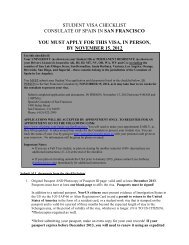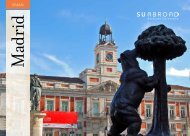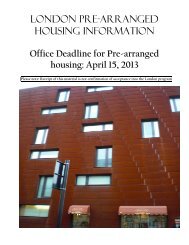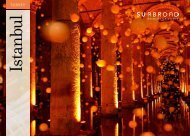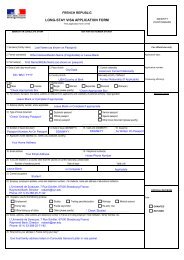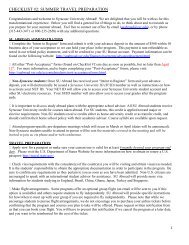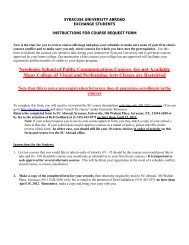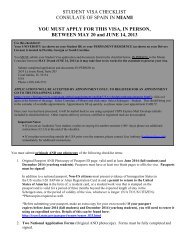Student voices - SU Abroad
Student voices - SU Abroad
Student voices - SU Abroad
- No tags were found...
Create successful ePaper yourself
Turn your PDF publications into a flip-book with our unique Google optimized e-Paper software.
Bonjour!This booklet was preparedfor you, yes you, by formerStrasbourg students. In it, youwill find lots of informationabout the Strasbourg Programfrom the perspective of studentswho actually lived it. Besides thegeneral statistics and practicalinfo, it is filled with things tosee and do, general advice forprepping and participating in theprogram, and little things thatmay have slipped your mind.We’ve tried to tell it like it is andpresent a true representation of allof our amazing experiences here.Yes, you have been told a billionand seven times that studyingabroad will be one of the besttimes of your life and the timewill fly by. Yeah, yeah, yeah,whatever. Well, they weren’t lyingto you. The only way you candiscover how true this is, is byexperiencing it yourself…Hope you enjoy this booklet andyour time abroad!Laura Desmond & Kayla Fedeson<strong>SU</strong> Strasbourg, Spring ‘09
contentsStaffPre-depatureHistory of StrasbourgThings to packHost familiesOptions?IntermshipsComment dit-on...?Don’t forget to...On the roadTravel seminarSample intineraryArrivalStrasbourg todayCulture shock...PracticalsGot culture?Night lifeSportsEating outAlsatian specialsWeekend tripsPlan your ownWhere to next?<strong>Student</strong> <strong>voices</strong>ReflectionsTips and advice14679131617202226272830323434384041424450
StaffM. Raymond BachM. Bach is the Academic Director of theSyracuse Center in Strasbourg. He has served asthe director since 2000 and knows the ins andouts of the center, as well as the nuances of lifein Strasbourg. M. Bach couples his excellentwork as the Academic Director with at leastone course per semester, which if conducted inFrench will drastically improve your expressiveability in the language. He also conducts theIdentity Seminar with the assistance of otherexpert instructors.Professor Bach is a highly achieved academicwith degrees from Amherst College andStanford University. He has instructed at avariety of universities in the United Statesbefore becoming an indispensable asset to the<strong>SU</strong> Strasbourg program. If one ever encountersa serious dilemma abroad, M. Bach is alwaysaccessible.M. Jean-Maurice MarxerM. Marxer is the Assistant Director andLanguage Coordinator of the Syracuse Center.His warm personality along with his engagingteaching style is greatly appreciated by studentsso far from home. M. Marxer teaches advancedlevels of French; FRE325, FRE326, and also leadsexcursions and field trips scheduled throughoutthe semester.1
Mme. Mick HardenbergSince 1989, Mme. Hardenberg has been theHousing, Community Internship Coordinator,Sexual Harassment Officer, and ResourcePerson for <strong>Student</strong>s with Disabilities. Eventhough she has a wide range of responsibilitiesat the <strong>SU</strong> Center, Mme. Hardenberg is alwaysaccessible to students throughout the dayand would be willing to talk about anything.Although Mme. Hardenberg is originally fromFrance, she has lived in Michigan and Texaswhile pursuing a Master’s degree.Mme. Allison BayartMme. Bayart is the assistant to the director andthe administrative specialist at the StrasbourgCenter. From handling the sale of textbooks tohelping to figure out your local bank account,she is the lady to go to.Mme. Sabrina BarelMme. Barel is the <strong>SU</strong> Center’s receptionist. Sheis the one to go to with help with documents,as well as any general questions about gettingaccustomed to life in Strasbourg and at theCenter. She has worked at the Center since2006 and can provide a wealth of information ineither French or English.2
history ofStrasbourgStrasbourg has been inhabited since the Bronze Age largely because it enjoysan excellent geographical position at the crossroads of waterways and overlandroutes. In 12 BC, it became a crucial base of the Roman Empire in defenseagainst the northern Germanic tribes. After the eventual fall of the RomanEmpire, the town became known as Stratisburgum and entered a period ofpolitical and economic growth. In 1262, the town broke free from the rulingbishops and the citizens of Strasbourg gained it the status of free imperial city.For most of the Middle Ages, Europe was synonymous with backwardnesswhile Strasbourg thrived. In the 15th century, Strasbourg transformed into afree republic attracting thinkers, artists, and progressives. This movement ofintellectuals and creative minds helped turn Strasbourg into a cultural center ofEurope.By the end of the 16th century, Strasbourg was caught in the unfortunateposition between the warring nations of Northern Central Europe whilesimultaneously dealing with internal political strife. This conflict eventually ledto the annexation of the Republic of Strasbourg to France in 1697. The Frenchinfluence provided new vigor and cultural stimulus to the city.The 18th and 19th centuries brought even more conflict to Strasbourg, whichended with the defeat of Napoleon III. After a six week siege on the citywhich destroyed many buildings and monuments, the city became part of theGerman Empire. This transition was fleeting however, and with the defeatof the Germans in World War I, Strasbourg was once again returned to theFrench in 1918.World War II opened a new chapter in Strasbourg’s varied and tumultuoushistory. Once again the consequences of war caused mass destruction in thecity. During the five years between 1940 and 1945, the entire Alsace region wasunder the control of Nazi Germany. The heroic French resistance of Charlesde Gaulle along with the help of allied armies finally succeeded in liberatingStrasbourg (and the rest of France) from the German occupation.After the end of World War II, Strasbourg regained its status as the crossroadsof Europe when in 1949 it was chosen as the headquarters of the Councilof Europe. Since 1979, it has been the seat of the 15-member EuropeanParliament and since 1994, the seat European Court of Human Rights.4
While Strasbourg has had quite a difficult past, its conflicting identities andnational loyalties have given the region a unique and unmistakable personality.The strong people of Alsace now have a great deal of contentment in theirheritage and you will often find that many are extremely proud of identifyingthemselves as primarily Alsatian but also French…5
Things to packSuitcases were made small for a reason… you can bring the really importantstuff, but leave the not-so-important stuff behind. When preparing, it is ageneral rule that you don’t need as much as you think you do. This is truly thecase, but what exactly falls into this generalization? Here’s what some formerStrasbourg students have recommended…I should have packed:Shower shoes/flip-flops (for hostels)An extra towel (for hostels or homes)Travel size toiletries of 3oz or 100ml (and keep them to reuse them)Makeup (a brand new package of your favorite brands)Peanut butter (it’s expensive and hard to find (note: E.Leclerc has Skippy!))Books (for downtime when traveling)Movies (Europe has a different DVD encoding)Pictures (room décor)Smaller suitcase (for weekend traveling)Teddy bear (a little extra comfort from home)French dictionarySweatshirts (heating is…different… to say the least)Personal medicationI shouldn’t have brought (as many):-Shoes (there are many to buy)Heels (yes, it’s own category… you will break your ankles on the cobblestone)Clothes (many have never been worn)Jeans (a total of or so three, they are heavy and take up room)Notebooks (you can buy them here)Toiletries (especially shampoo!)Hairdryers and hair straighteners (they fry converters, so just buy them here)Happy Packing!6
host familiesBut I want to live with my friends!Don’t worry, you’ll still be able to seethem. The <strong>SU</strong> Strasbourg Programplaces all of their students in a homewith a French family. This can varyfrom single professionals to a familywith children and a puppy. Youare matched with families usingthe housing request form, so bespecific when you respond. If youare “allergic” to having surrogatesiblings, let them know!How is this better than living with friends you ask?• You will be able to use your French outside of the classroom over mealtimeconversation.• Mealtime conversation = yummy food, prepared by your host family. Platescan range from Alsatian specialties of choucroute to Basque region mealsfeaturing couscous, and maybe even spaghetti. And probably, with everymeal, lots of bread.• You will get to learn about people who you will have never encounteredin your time abroad. You will be able to learn facets about the lives ofFrench children and adults that even Wikipedia doesn’t tell you. They willbe able to answer many questions you may have about France in general,such as the economy or politics.• Families sometimes take students on weekend trips. Some have been tothe spas in Germany. historical castles in the Alsace region and hiking inthe Voges.• Even though they may be strangers at first, they are there to help you. Manyfamilies have already hosted students, so they expect that you will needthings and to be patient with you.• No worrying about paying rent or finding somewhere reasonable to live.Just let the staff take care of it for you.7
This unique experience can be very rewarding. But it is what you put into it.Things may be different and hard to adjust to at first, but if you stay open todiscovering a different lifestyle, it will be that much better. It was also give youa better understanding of a different style of life.Don’t be shy… they know you are a student studying French. Don’t be afraid topractice your skills, no matter how terrible you think you are. The more you doit, the easier it will be to speak French in your everyday life.(top L) studentshaving brunchtogether at theirhost home.(top R) havingdinner at a hostmother’s cafe.(bottom) doinga duet with herhost motherat the Center’sfamily day.
Option IV/Music PerformanceAt the Conservatoire National du Région deStrasbourg, students receive lessons on theirprimary instruments, music history courses andhave the opportunity to play in an ensemble.Courses there are usually supplemented byOption I classes.Entry into the program is condition on anaudition that is sent in to the conservatory.For more details, please contact the musicdepartment at the College of Visual andPerforming Arts.SummerHome to the Council of Europe and the European Court of Human Rights,it only stands to reason that the Maxwell School offers a program inStrasbourg. Open to both graduate and undergraduate students, courses areavailable in European Human Rights and Conflict Resolution. Class workthere is supplemented by field trips to see international proceedings and thesurrounding region. <strong>Student</strong>s are also allowed to apply for internships at theCouncil of Europe and other international bodies. For more information,please contact the international relations department at the Maxwell School.11
Qitong Chen (Spring’10) in apromotional photoshoot for herfull-time summer internship atZut Magazine
InternshipsAmong the different classes and activities <strong>SU</strong> Strasbourg offers, interning is anoption that can make your time abroad unique. Many students have internedat the Council of Europe, which is seated right in Strasbourg. Other studentshave received internships ranging from media and communication companiesto assisting with teaching English in schools. Your individual interests aretaken into account here, providing you with an opportunity you probably won’tfind elsewhere. In general, about 50 percent of students participate in this eyeopening opportunity. (an internship=un stage, interns=stagieres)If you are interested in doing an internship, you can submit an internshiprequest form and resume with your application. This is especially important ifyou would like to work at the Council of Europe. At the Center, M. Hardenbergwill work to place you according to your interests. However, obtaining aninternship is also dependent on on-site interviews with the organization. Youmight also be required to modify your resume en Français.Internships can count 1-3 credits and can be used to fulfil requirements(check with your college!). The amount of credit you take it for determines therequired hours and how long your final report has to be.Notes from studentsI interned at the InternationalBilingual School of Strasbourg.I assisted the teacher in Englishclasses for first and second graders.The kids are adorable and it wasincredible to watch and help themlearn a foreign language. They pickup everything so fast. I wish thatFrench came that easily to me!– Danielle Alvarez, Spring ‘09Council of EuropeI was placed at Hotel REGENT de la Petite France in the reception area. WhatI enjoyed most about my “stage” is the fact that I got to meet and interact withpeople from all over the world twice a week. Early April was exciting becausethe Canadian delegates to the NATO Summit stayed at my hotel!– Laura Desmond, Spring ‘0913
I worked with the Pompidou Group, a division within the Council of Europethat is aimed at combating drug use and drug trafficking in Europe. I amworking with the prevention side of the department, more specifically youthprevention. Currently my project is researching ways to inform and preventdrug use by youth in recreational settings, such a beach vacationing orclubbing.– Kari Martin, Spring ‘09I worked at a small-scale television/film production company called ViaStoria, just outside ofStrasbourg. I learnedhow the mediaoperates in Francecompared to that inthe U.S. I was able toattend film shoots andobserve the editingprocess. I also pickedup a large amount ofFrench vocabularyfrom professionals inthe business… rangingfrom technical terms toeveryday slang.- Kayla Fedeson,Spring ‘09I interned withConjonxion Agencede Publicité, a smalladvertising agency. I gotto help with client andmedia research, sit inon meetings with clients,aid with event planning,and of course practicemy French. It is in a veryconvenient location inStrasbourg, and it wasgreat to have had this opportunity while I was abroad!– Courtney Taddonio, Spring ‘09Sarah Lee (Fall ‘09) interned at local boulangerie, Au Pain de Mon Grand-PereI shadowed the nurse at Le Foyer de l’Enfance in Neuhof, which is essentially achildren’s shelter for children and adolescents ages 0-18. Kids are placed therebased on difficult familial situations. Working there has given me some insightinto the social services offered in France. It is absolutely wonderful to be ableto interact with young children and learn about various medical/nursingpractices in the country.– Holly Kuman, Spring ‘0914
SummerKeen to practiseyour French in areal life setting?Why not tryinterning overthe summer?<strong>Student</strong>s have theopportunity tointern in a varietyof places, fromindependentstudy at theInstitut Nationaldes SciencesAppliques in Strasbourg to any of the community-based internships that areavailable during the semester. Some also choose to extend their semesterinternships into the summer.Institut National des Sciences Appliques in StrasbourgLike during the academic semesters, students stay with host families and areinvolved in field trips around the region. However, applicants over the summerare required to have at least an intermediate command of the language.Some places students have interned before...• The Council of Europe• International Institute ofHuman Rights• CCI (Chamber of Commerce)• Pro-Anima (Animal Rights)• City Council• Fédération du Parti Socialiste• AMSED and CASAS (working withmigration and asylum seekers)• Regain (shelter for women victimsof violence and their children)• Foyer de l’Enfance (children whotaken from their homes and placedby a judicial decision)• CIR (working with refugees)• Lycée Jean Rostand (high school)• BISS (Bilingual International Schoolof Strasbourg)• Au Pain de mon Grand-Père(bakery)• Conjonxion (Advertising agency)• Régent Petite France(four-star hotel)• Sophie Peirani (designer)• Cité de la Musique et de la Danse(Conservatory)• Cinema Odyssee15
commentdit-on...?Familiar phrase? New to the French language? (In that case, “how do you say”is the translation). These valuable words and phrases will become extremelyuseful to adapting to life in France. (Of course, they’re not all grammaticallycorrect, so don’t try to use some of them in a French composition).Les Grandes Questions = the big questionsQui? = whoQuoi? = whatQuand? = whenOù? = wherePourquoi ? = whyComment ? = howLa vie en générale = life in generalC’est pas grave = Not a problemRien de spécial = Nothing specialJe sais pas = I don’t knowPas encore = not yetPardon = sorry/excuse meBonne journée = have a good dayBonne soirée = have a good eveningAu restaurant = at the restaurantJe voudrais… = I would like…La carte = menuLa carafe d’eau = carafe of water (this way, it’s free)Une bouteille de vin = a bottle of wineL’addition, s’il vous plait. = Check please.16
don't forget to...Yeah, I know... another checklist. Last one, we promise!Get your passportApply for your visa early!You will get endless emails about this. This is perhaps the mostimportant piece of paperwork you need. In previous years, students havebeen turned away and had to make a second trip to the embassy. So sign upfor CampusFrance, get your documents together, triple check with JulieRiverso that you have everything and play nice at the French Consulate.Inform your credit card company that you travelingYou don’t want them putting a hold on your account for suspected fraudwhen you are buying those Spring Break tickets.Make a photocopy of all your important documents and keep themseperately (just in case)On packing...You are only allowed to take two suitcases with you and you will primarilybe the one lugging them around, so keep it light. The bulk of your baggagewill also be sent ahead to the <strong>SU</strong> Center, so pack seperately for the travelseminar.that said... Bon Voyage!17
Bruges, Belgium
Travel SeminarWait, my plane ticket doesn’t say Strasbourg?!?Each semester kicks off with a unique travel seminar, allowing you andyour fellow students to see different parts of Europe through the lens of anacademic. In the fall, students concentrate on Eastern Europe, traveling tocountries such as Germany, Poland, and the Czech Republic. In the spring,students generally see France, Belgium, The Netherlands, and Germany.Activities on these trips can include walking tours of various cities, hearinglocal and national politicians speak, and exploring museums with historical,social and political significance. Many national and local issues are broughtto the foreground that students with an American perspective may not befamiliar with, which allows them to better prepare for life in Europe.These seminars are a great way to kick off the semester. They allow students toget to know who they will be taking classes and become friends with for thenext semester. Many students come from different colleges & universities, aswell as <strong>SU</strong>. This interaction, which can be unique to abroad study, allows you toget to know your future classmates beyond a normal academicsetting.The travel seminars are anything but a vacation. You will constantly be learningabout things you have never discussed before. You will be waking up earlywith planned itineraries and readings. You won’t be seeing the typical touristsites, but ones that are less familiar. Keeping an open and optimistic mindsetare extremely important to making these seminars a successful and rewardingexperience. Despite all these factors, the seminar will be something you canlook back on and say “whoa.”The things students liked best about these seminars are that you get to see somuch in so little time, some of which you would have never ventured out tosee on your own. The itinerary is pretty much set in stone, so you don’t needto worry about finding things to do. Plus, instead of taking trains and planes,you have the luxury of napping in your very own tour bus, where you willinevitably be catching up on your sleep.However, if you are a music student, plans are slightly different. Though you flyin with everyone else, your commencing travel seminar is only five days long.But don’t fret, you are not being cheated out of an experience. The travelingseminar for you is at the end of the semester where you will run around Lepzig,Berlin, etc seeing the historical roots of music.20
sample itineraryPSC 400.2/HST 400.3EUROPEAN IDENTITY SEMINAR FALL 2009“Shifting Borders, Shifting Identities”FacultyProfessor Raymond Bach (Resident Academic Director, <strong>SU</strong> in Strasbourg)Professor Jean-Maurice Marxer (Assistant Director, <strong>SU</strong> in Strasbourg)Professor Witt Raczka (Political Science and History, <strong>SU</strong> in Strasbourg)Tuesday, August 25: Berlin-- DAY 111:55 a.m. Arrival at Berlin Tegel airportMet by Professors Bach, Marxer and Raczka(Put luggage for Strasbourg on separate bus)1:30 p.m. Check into HOTEL TRANSITHagelberger Strasse 53-54Phone: 49 30 789 0470; Fax: 49 30 789 047773:00 p.m. Walk to “KREUZBERG HILL” for Welcome remarksand Course Introduction5:45 p.m. Leave hotel for GROUP DINNERat Brauhaus Südstern (Hasenheide 69)Wednesday, August 26: Berlin -- DAY 2Breakfast9:00 a.m. Leave for MUSEUM ISLAND and a Walking Tour(Bring a bottle of water with you!)12:00 p.m. Lunch on your own2:45 p.m. Bus leaves hotel for the HOLOCAUST MEMORIAL5:00 p.m. Visit BUNDESTAG (REICHSTAG)Bus Returns to HotelDinner and evening on your own22
(top L) Spring ‘10 group at Versailles, Paris. (top R) Figuringout where to go in Paris. (bottom) Seminar group by the Rhine,the river that runs between France and Germany.
EUROPEAN IDENTITY SEMINAR SPRING 2010FacultyProfessor Raymond Bach (Resident Academic Director, <strong>SU</strong> in Strasbourg)Professor Jean-Maurice Marxer (Assistant Director, <strong>SU</strong> in Strasbourg)Professor Hans-Peter Schmitz (<strong>SU</strong> Maxwell School: Dept of Political Science)Tuesday, January 5: Paris-- DAY 18:35 a.m. ARRIVAL IN PARIS, Group Flight (AF #007)Met by Professors Bach and Marxer(Put luggage for Strasbourg on separate bus)Take luggage to FIAP JEAN MONNET, 30 rue Cabanis, 75014Tel: (33) (0)1 43 13 17 00Lunch on own at FIAP if arrive in time(served 11h45 - 13h45); or on your own1:00 p.m. Leave FIAP by bus for LES INVALIDES (Napoleon’s tomb)3:30-4:30 p.m. Boat Ride on the Seine5:30-7:00 p.m. SEMINAR ORIENTATION For all studentsCOURSE INTRODUCTION Except for music studentsAt the FIAP Hotel: Room TBADinner at the FIAP (6:30 to 8:30 p.m.)Tuesday, January 6: Paris-- DAY 2Breakfast at FIAP (served: 6:45-8:45 a.m.)9:00 a.m. Bus leaves for Luxembourg Gardens followed by a visit toLe Panthéon: “Official Memory, History & National Identity”12:00 p.m. GROUP LUNCH at the Mosquée de Paris (couscous!!)2:30 p.m. Visit to the Cité Nationale de l’Histoire de l’ImmigrationPalais de la Porte Dorée (293 avenue Daumesnil) withProfessor Nancy Green, historian and professor atthe Ecole des Hautes Etudes en Sciences Sociales5:00 p.m. Return to FIAPDinner at the FIAP (6:30-8:30 p.m.) and evening on your own24
Strasbourg todayStrasbourg today is a modern city with plenty to do for college students. Thelarge student population of the city keeps the nightlife exciting and varied, yetthere is also plenty to do in terms of cultural growth, whether it is a night atthe Theatre National de Strasbourg(TNS), or a leisurely Saturday spentat one of the many museums. Atthe border of Germany and France,it also offers many opportunities toexperience both cultures. So walkaround, jump on a bike and explore!(clockwise from top) <strong>Student</strong>s having lunch at atrattoria near Homme de Fer. Class of Summer ‘09.Farewell dinner with M. Marxer. <strong>Student</strong>s fromSpring’09 having a pique-nique between classes.<strong>Student</strong>s at L’Orangerie, a park near the <strong>SU</strong> Center.26
Culture Shock...Ok, it will happen, even if it is only to a minor degree. In order to help youprepare for the inevitable, we have compiled a list of things that will undeniablyevoke a sense of homesickness during your time in France along with some tipsto help you adjust to the “shock.”• So you waited until Sunday to try and run errands? Looks like you’re out ofluck, nothing is open!• The 2-hour lunch breaks! How can anything get accomplished in this country?!?• Be prepared to bag your own groceries...and pay for the bag too!You usually have to ask for the bag!• Get used to long, slow moving lines! EVERYWHERE!There is no hurry for anyone apparently.• French people mind their own business. They seldom greet strangers theymeet on the streets like the Americans do.• It is also normal for people to walk in front of you to reach for something.French people do not consider it rude to do that. You may even find you missthe space when you return to the States.• This is a county of strikes and protests. Strikes may last a day or two, or just afew hours. The strikes that prove to be the most bothersome for <strong>SU</strong> studentsare those that impede transportation, at various times during the year thebuses, trams, and trains may stop running because of unhappy employees.• SO MUCH CHEESE and YOGURT, it may seem exciting to have so manyoptions but at one point or another you may feel a wave of nausea whenconfronted with the idea of a creamy slice of brie.• If you cannot stand taking notes on graph paper, bring your own lined paper.It’s almost impossible to find here.• Laundry machines are smaller and most people don’t have dryers.Hand washing will become a beloved activity.• Take the prices for what they are. You will waste more time seeing that asandwich costs €4 and converting it to USD than the time it’s actually worth.Prices are what they are.• Get a plug converter! The outlets here are different... this will save your life!• The numbers 1 and 7 look differently when written by hand. Learn how they look.• When travelling, learn the basics of whatever country’s language you are in.This includes “please, thank you, yes, no,” and of course, the ever-useful“do you speak English?”27
PracticalsTransportationBeing a compact and busy city, travelaround Strasbourg is a piece of cake.A network of buses and trams connectyou to almost anywhere you want togo. They run frequently from early inthe morning to about 12.30 a.m. Pastmidnight, there are special bus linesthat run to the major stops, so thereis no need for late night hikes. Uponarrival at the <strong>SU</strong> Center, you willbe issued with a monthly bus/trampass. This allows you unlimited rideson either. The passes have a month’sworth of credit and can students aregiven an allowance to top it up.However, most choose to rent a bicycle for the semester. Its a convenientalternative and makes for some fun exploring. Plus, Strasbourg is mostly flatand has well marked bike trails, so riding to and from class is a breeze. Bikesrun about twenty euros a month for rental but you are required to put down arefunded security deposit before hand. The largest bike vendor is located in thebasement of the Strasbourg train station. (Gare Centrale on the A or D)28
All-purpose storesSince we told you not to pack the kitchen sink, we figured it might be a good ideato tell you where you can get one, or at least a hair dryer. The popular options are:Monoprix (Place Kleber, Tram stop: Homme de Fer)FNAC (Place Kleber, Tram stop: Homme de Fer)E. LECLERC (next to the conservatory, Tram stop: Etoile Bourse)Place des Halles (Tram stop: Les Halles)Cell PhonesMost students purchase cellphones while they are abroad. They may not be cheapbut they are still more affordable than using a roaming plan. It is especially usefulwhen you are lost and need someone to call. You have a choice of getting a prepaidSIM card that you can use in your existing phone or you could buy a phonethat comes with the a prepaid plan. The main providers in Strasbourg are Orange(used in other parts of Europe too) and Bouygetel. They each have different deals,so scout around and see which one suit you. Most of the phone stores are locatedaround Homme de Fer so you can explore and make your choice. You will getmore details on how to get a cell phone when you get there.For international calls, there is always Skype, a free online calling program. Manystudents make these online calls at the <strong>SU</strong> Center as there is wireless availablethere. In addition, there are calling cards that you can get at the tabac or online(try www.zaptel.com).BanksThere are several ways to handle your cash. Before you go abroad, check to seeif your existing Visa or MasterCard debit card works internationally. Also letyour bank know that you are going to be spending sometime abroad so that theydon’t think that credit card fraud is going on. BNP Paribus (affiliated to Bank ofAmerica and HSBC ATMs are readily available in Strasbourg.You can also open a CIC local account. <strong>SU</strong> students get a special deal and canopen a temporary account for a one-time fee of 15 euros. The representative fromthe bank even comes to the Center. There are no opening or closing fees. Youwill receive a Eurocard MasterCard that lets you draw money from any ATM inFrance and any ATM in Europe for an exchange fee (Switzerland and England).However, cards can only be used online on French-based Web sites. Convenientbut if you have either HSBC or Bank of America, not entirely necessary.29
Got culture?Okay, so you’re probably thinking that just being abroad, living with a hostfamily, possibly interning, and enjoying the nightlife is just about as muchculture shock as you can handle, right? Understandable, but Strasbourgoffers a wealth of other ways to more fully integrate and profit from what thecommunity has to offer. As we have already mentioned, Strasbourg’s uniqueposition on the border of France and cultural heritage of Alsace representsa mix of both French and German influences. A wide variety of interestingcultural activities are always available...from opera, theatre, or vaudeville andcabaret shows, Strasbourg’s cultural life is worth exploring.If you enjoy concerts and the like, a good thing to have is the Carte Culture.It is availanle to students aged between 15-25 and costs about seven euros.It gives you discounts and offers to more than 40 different cultural locationsaround Strasbourg. You can see all that is available at http://www.carte-culture.org/. Another good place to check on event updates is http://www.strascity.com/.Théâtre National de Strasbourg1, rue André-Malraux03 88 24 88 00, www.tns.frTNS is a world renowned theatre with French and international spectaculars.Le Maillon - Théâtre de Strasbourg13, place André-Maurois (Hautepierre)03 88 27 61 71, www.lemaillon.frThis modern theatre with very interesting programs is currently situated inParc des Expositions in Wacken. Le Maillon is a theatre and a concert hall,recommended for its comforting atmosphere.Théâtre Jeune Public7, rue des Balayeurs03 88 35 70 10, www.theatre-jeune-public.comTJP is a drama center with productions intended for children and adolescents.TJP has two auditoriums: one is situated in rue de Balayeurs and the other oneis located in Petite France.Opéra National du Rhin19, place Broglie03 88 75 48 23, www.opera-national-du-rhin.comThis world renowned opera house offers classical and contemporaryperformances.30
Orchestre PhilharmoniquePalais de musique et des congres, Place de Bordeaux03 88 15 09 09, www.philharmonique-strasbourg.comOrchestra offers classical and contemporary programs with local andinternational artists.Conservatoire National de R égion de Strasbourg10, rue de Hohwald03 88 23 77 23Palais de la Musique et des CongresPlace de Bordeaux03 88 37 67 67, www.strasbourgmeeting.comAlongside staging concerts of Philharmonique, Palais also accommodatesvarious shows (theatre, music, dance, cabaret...)Le TapsTaps Gare (Laiterie), 10, rue de HohwaldTaps Scala (Neudorf), 96, route du Polygone03 88 34 10 36, www.artefact.orgThese two city halls offer you theatre, dance, chanson and comedy shows. Also,the Laiterie hall across the street from the Taps Gare offers alternative musicprograms.
La Choucrouterie20, rue Saint-Louis03 88 36 07 28, www.choucrouterie.comThis is where one should go if they are interested in experiencing Frenchcabaret. Careful though, the shows are in French and in Alsace dialect!Le Cheval Blanc25, rue PrincipaleSchiltigheim, 03 88 33 70 70This is a famous Strasbourg winery but it’s another hot-spot for cabaret.L’IliadeAllée François-Mitterrand, Illkirch-Graffenstaden03 88 65 31 00, www.illiade.comLocal auditorium that stages various concerts, cabaret and theatre shows.Night LifeThe many bars in Strasbourg Bars stayopen until at least 11:30 pm and oftenuntil 4:00 am. One of the refreshing partsof Strasbourg nightlife, especially forstudents from <strong>SU</strong>, is that dress code andadmission requirements are not an issuein Strasbourg, so in other words there areno long lines in the freezing cold for IDchecks and admission.BarsThe relaxing Académie de la Bière, 17rue Adolphe Seyboth, is open daily until04h00, serving over 70 varieties of beer(including beer cocktails, a must-try) ingorgeous, wooded interiors. The Quai desBières, at the Pont du Corbeau, also offersa large choice of beers and cocktails.Another must is Les Frères Berthom,32
18 rue de Tonneliers, with attractive décor, friendly staff, a good variety of beerand excellent cocktails - small wonder it is so popular. Murphy’s House, 9rue des Frères, is an ever-popular Irish pub, although not the only one in thecity. It comes complete with Irish beers, Celtic music and British television.Irish Times, 19 rue Sainte Barbe, also has live music, foreign beers on tap, andEnglish-speaking staff. They have quiz nights on Wednesdays. Dubliners isanother lively Irish pub, not to be missed on St. Patrick’s Day.Pub Nelson, 20 rue des Couples, is another hangout, with a wide choice of beers.The popular Tapas Café, 16 rue de Bain Finkwiller, is an ideal place to sink ajug of Sangria with friends. If you’re in the mood for a good cocktail in a quaintsetting, definitely head towards the « boat bar/restaurants » of the StrasbourgPlage that line the river. L’Artichaut located at 56, Grand Rue, is a great artsycafé bar offering live jazz on Thursday nights. It is a favorite of many an <strong>SU</strong>Strasbourg student.So…you just wanna dance…?Le Divan, 6 impasse de l’Ecrevisse (www.le-divan.com), with striking décorand on two floors with different ambience, plays Latin music, R&B, soul, house,groove and salsa. A mixed crowd dances the night away at Le Chalet, 376 routede la Wantzenau (www.strasbourg-by-night.com), with two dance floors, pluskaraoke, restaurants and bars in a huge complex. Le Retro, 24 place des Halles(www.leretro.com), is a dressy, trendy disco for over-25s only; however they havea Thursday night “Ladies’ Night” with no age requirement. For a low-budgetstudent vibe, try Le Caveau (or K’vo), 1 place de l’Université. Situated undera university canteen, this is about as studenty as it gets. Then of course there’sJimmy’s Bar, 30 quai des Bateliers, where it’s not hard to end up dancing thenight away.Live music is more your style…?La Salamandre, 3 rue Paul-Janet (www.lasalamandre-strasbourg.fr), is a popularvenue that hosts around 40 major concerts and shows every year. Internationalstars that have graced the stage include The Stranglers, Les Négresses Vertes,Pulp and Tri Yann. With space for just 500 people and reasonable prices, earlybooking is essential. In the absence of major performances, check out a widevariety of theme nights, for example salsa, 60s, 80s, student, heavy rock andreggae. Another top venue for live performance, with cabaret, world music andblues is La Laiterie,13 rue du Hohwald (www.laiterie.artefact.org), where reggaesensation Sinsemilla played in 2009. Plus it would be a good idea to occasionallyseek-out concerts on your own. In April 2009, Bob Dylan performed inStrasbourg and at least one proactive <strong>SU</strong> student was there.33
SportsJust because you are away from theOrange doesn’t mean you have to besports deprived. Though people don’tharp on it as much, there are manyways to stay active in the sports scene.Conveniently, Strasbourg has its ownlocal basketball team whose games arepretty affordable and can make a greatweekend activity. Given the severalstadiums around, check out Officesdes Sports de Strasbourg (www.ods67.com) for more sports.If you are more for playing sports, you can sign up for a <strong>SU</strong>APS card (https://wo.u-strasbg.fr/app/WebObjects/<strong>SU</strong>APSWeb.woa.) It is the sports program thatis affiliated with Université de Strasbourg and offers a wide variety of classesand programs. <strong>Student</strong>s have done yoga, played ultimate frisbee and gone rockclimbing. Plus it gives you a chance to interact with other French students, trustus excited cheers can cross the language barrier.Eating OutSo your host family only has to provide you meals five days a week, but whatbetter opportunity to explore what the local restaurants have to offer. And ifthere’s one thing that Strasbourg does not lack is places to enjoy good food.Take advantage of weekend meals on your own to sample the wide range ofglobal cuisines that the local restaurants have to offer.Food of the AlsatiansFor those intrigued by local fare, dinner at a winstub should be a priority. Awinstub is a typical Alsatian eatery where one can enjoy local cuisine in acomforting and hearty setting. They usually have wooden tables and red andwhite checkered table clothes that evoke a sense of ‘hominess’ and nostalgia.34
Many winstubs can be found on the streets of La Petite France and close to theCathedral. But here are some winstubs worth the visit:Le Baeckeoffe d’AlsaceAt the heart of old Strasbourg, lovers of genuine cuisine can find the flavourswhich have made Alsace a treasure for those who like good living and a warmwelcome.Chez YvonneThis winstub is a magical and very charming house in which each ‘stub’ (room)exhales its own intimacy, brings out a feeling of warmth and well-being. Inwhatever corner one might sit, it will feel like homeChoucroute,a traditionalAlsation dishCuisines of the WorldLonging for something non-Alsatian? Strasbourg is a multi-cultural city so thevariety of restaurants ranges from Italian to Japanese…ItalianOne can’t really go wrong with Italian and there are many options. Here arejust two places, among a wide range of choices.35
Broc en StockItalian restaurant where gnocchi and pizza are the house specialities and hasreceived great reviews. Closed Sundays. 15 quai des Pecheurs.Aux Mille PatesA popular Italian restaurant with outside terrace. Fresh pasta dishes are thespeciality. 8 place Saint Etienne.MexicanBe warned, not the Mexican you may be used to! (Arguably it is much worse.)Tex DreamTex-Mex and other international cuisine. Air-conditioned and non-smokingroom. Open 7 days a weekSpanish/TapasCanas y TapasA tapas bar in the Spanish tradition. 12 quai St Nicolas.CocoLoboA rustic place with outdoor seating, great sangria and fantastic churros. 2 ruede Glacières.PortugueseLa PatrieRestaurant specialising in Portuguese menus and desserts. Closed Sundays andMondays. 1 rue des BalayeursIndianKashmirIndian restaurant with all details of Indian decoration and menu. 2 rue desBouchers.Le MaharajaIndian restaurant with full range of Indian dishes and curries. Open 7 days aweek. 15 quai des Bateliers.Middle EasternLe GolbasiFamily run restaurant with Greek and Turkish specialities. Kebabs for takeaway are on sale. 35 Grand RueLe TarboucheOffers delightful Lebanese food. 22 rue Munch.JapaneseFujiyamaJapanese restaurant specialising in sashimi and teriyaki dishes.Open 7 days a week. 19 rue des Veaux.36
ChineseLa Grande MuraillesExcellent Chinese food. 29 rue Du Vieux Marche aux Vins.Eastern EuropeanLe Saint FiacreRestaurant in old Strasbourg with Russian, Hungarian and Polish specialities.Flavoured vodkas. Closed Sundays. 86 rue Saint-Fiacre-Robertsau.Other AlternativesUnfortunately, the cost of eating out really adds up, so it is definitely a goodidea to become familiar with the many grocery stores in Strasbourg. You maywant to keep some food in your room for late night studying or long weekends,or you can even test your culinary expertise within the confines of the <strong>SU</strong>Center ‘Kitchen’. If you’re on a tight budget I would recommend sticking tothe larger grocery stores which tend to be significantly cheaper than the smallshops located on many side streets/corners.There are many COOPs which can be found all around the city and are apopular choice for many students, the closest COOPS to the <strong>SU</strong> Center isSupermarché COOP Robertsau, 85 rue Boecklin.Tarte Flambée37
One of the most inexpensive grocery stores that students have discovered islocated in the lower level of Rivétoile, a mall just outside Centre Ville. The storeis named E. LECLERC, and is the closest thing to a Super Wal-Mart or Targetin Strasbourg.Another convenient, but slightly pricier grocery store is the MONOPRIX rightin Place Kleber 5, Rue Grandes Arcades.There are also some more gourmet grocery stores located in the GalleriesLafayette 34, rue du 22 Novembre as well as in the Place des Halles centrecommercial 24, Place des HallesThere are of course other options, so go out and discover the city!Alsation SpecialsFoodAlsatian specialties are numerous and can be eaten in many traditionalrestaurants. Particularly, you ought not to visit Alsace without having triedchoucroute: the signature sauerkraut and sausage platter. Other specialtiesinclude the Alsatian pork-butcher’s meat, Flammenküche or flams (tartesflambées in French): a sort of wafer thin pizza made with onion-cream sauce,Baekehof: beef and pork stew cooked with potatoes and carrots.Drinks• Vin Chaud - A perfect mix of red wine, citrus and spice, served steaminghot. A fantastic companion to Carnival festivities.• Monaco - A delectable beer cocktail not recommended for those who favorhearty brews. This mélange of lemonade, grenadine, and blonde beer is aStrasbourg must.• Crémant d’Alsace - Alsatian version of Champagne, arguably better. Itis against French law to call something champagne, unless it is made in theChampagne Region of France.• Kir - Not necessarily Alsatian, but another must try while in France. A greatapéritif.1/3 de crème de cassis de Dijon , 2/3 de vin blanc de Bourgogne (Aligoté raisin)38
WineFrom this glass every day, I drink to your health a genuinely fresh and floweryAlsatian wine - Henri Matisse• Sylvaner-A remarkably fresh, light wine with a delicate flavor. It is refreshing,vivacious and easy to enjoy.• Pinot Blanc - Well rounded and delicate, fresh yet supple. It represents thehappy medium in the range of Alsace wines.• Riesling Dry - refined and delicately fruity. It has an elegant bouquet withsometimes mineral or floral notes, giving it good ageing potential.Recognized as one of the world’s finest white wine varietals,it is a gastronomic wine par excellence.• Muscat d’Alsace - Very aromatic and wonderfully grapey. It is a dry wine,very different from the sweet Muscats of the Mediterranean.• Pinot Gris - Rich, full bodied and with a long finish. It displays woodlandaromas, sometimes slightly smoky, with characteristic opulence androundness.• Gewurztraminer - Full bodied and exuberant, powerful and seductive. It isthe best-known Alsace wine. Its deep bouquet displays rich aromas of fruit(mango, lychee), flowers (rose petals), or spices (the prefix “Gewurz” means“spice”).• Klevener de Heilligenstein -This less aromatic grapevariety derived fromthe old Traminer or SavagninRose is much appreciated bygastronomes. Itis grown only in a definedarea in Heilligenstein.• Pinot Noir - The only Alsacevariety producing redor rosé wines, the wines havea typically cherry-like, fruitycharacter. Matured in oakbarrels, it gains additionalstructure and complexity.• Gentil and Edelzwicker -Gentil and Edelzwicker arenames for harmoniousblends of several whitegrape varieties (Gentil mustcontain at least 50% ofRiesling, Gewurztraminer,Pinot Gris and/or Muscat).39
Weekend tripsAs part of the program, there are several weekend trips that are worked intoyour busy schedule. <strong>Student</strong>s have participated in hikes, visiting Heidelberg,Germany for the day, and spending the weekend in Nantes. These tripsare a great way to explore the region of Alsace and the areas surroundingit. Activities can range from touring medieval castles to tasting Frenchchampagne early on a Sunday morning. Plus, there it’s a nice break frommaking all the travel plans yourself.(clockwise from top L) From a weekendtrip to the vineyards, Château du Haut-Kœnigsburg, seeing how champagne is madeat the world-famous Taittinger, studentswandering the streets of Remis.40
Plan your ownWhile in Strasbourg, the whole of Europe and then some is open to you. So ifyour dream is to go to Greece, then it’s time to make it come true! There areseveral budget airlines that offer great deals. Many students swear by EasyJetand RyanAir to get them around. Beyond that, others have taken road tripsinto Germany and Prague, Eurolines bus service will also take you as far asAustria, without the hassle of airport security and there is always the ferryfrom Barcelona into Morocco. So how you fill your passport is really up to yourimagination, but here are some of the frequented locations:1. Galway, Ireland2. Dublin, Ireland3. London, England4. Paris, France5. Barcelona, Spain6. Madrid, Spain7. Essaourira, Morocco8. Luxembourg9. Bruges, Belgium10. Brussels, Belgium11. Amsterdam, Holland12. Berlin, Germany13. Stuttgart, Germany14. Geneva, Switzerland15. Zurich, Switzerland16. Lausanne, Switzerland17. Rome, Italy18. Venice, Italy19. Budapest, Hungary20. Malta21. Athens, Greece22. Thira (Santorini), Greece23. Istanbul, Turkey24. Stockholm, Sweden25. Nice, FranceAt the museums of ParisA trip to Venice, Italy41
where to next?Done with a semester abroad but still have wanderlust? Well, there are a coupleof ways that you can still hang out abroad...• Couchsurfing(www.couchsurfing.org)This is one way of traveling on abudget. Couchsurfing is avolunteer-based Web site whichconnects travelers with localcommunities they visit. Bysigning you can talk to peoplefrom all over the world and askfor advice or for a place to crashwhen you get there. Though itmay sound some what perturbing to trust a total stranger to let you intotheir house, there have been many success stories and members can befurther verified by their credit information. Extending our stay in Caen,some friends and I were fully expecting to sleep on the beach for thedifference, but the couchsurfing host that we were with rang up some friendsand we were soon set up in someone’s guest bedroom for the next two days.So give it a shot.• WWOOFing(www.wwoolf.org)WWOOF or World WideOpportunities on Organic Farmsis a volunteer network that letsyou work on an organic farm inexchange for free room andboard. You could pick anywherein the world. The plan is that youwork for half the week (orwhatever you agree upon withyour host) and then get a few daysoff to explore the area or travel. It’s a pretty good trade off. Another goodorganization is Help Exchange (www.helpx.net), same concept, widervariety of ‘jobs’.P.S. The WWOOF Web site also has good links to for the intrepid traveler.(http://www.wwoof.org/otherorgs.asp)42
Tips and adviceWhile studying abroad, you will have the opportunity to do many differentthings… from exploring the city of Strasbourg and what surrounds it totravelling outside of the area. Throughout the duration of a semester, there isonly so much that you can do. While there are a few things that students herewish they would have done, there’s also an extensive list of things that theyhave no regrets for doing.What I wish I had done…• Spent less time at the <strong>SU</strong> Center. There are many cafés and sights around thecity to see. Homework or internet time outside the center would allow a moredirect interaction with France whether it is at a boulangerie or McDonald’s.• Saved more money before coming abroad. Travel, eating, shopping, andentertainment expenses can add up more quickly than you can ever imagine.Coming here with more saved money definitely helps. Plan on saving thatmoney from that summer job up instead of buying the latest video gameconsole.• Budget that money. Oh, this only costs this much. Over time, that will addup. If you plan things out ahead of time, as the semester nears its end, it willbe much easier to do and buy those things that you didn’t in the beginning.• Parlé en français. You are in France among English speaking students whoare studying French as well. Practice your French with them. Listen topeople’s accents. If someone in a restaurant speaks to you in English, try toreply in French. Immerse yourself in the language instead of falling back toyour comfort zone.• Find a good balance between traveling and staying in Strasbourg. Somepeople come here with goals of travelling, staying in Strasbourg, orsomething in between. As you spend time here, you will learn which one ofthose best fits you. There is much to see everywhere in Europe (and itsnearby neighbors) so make sure to make the most of your traveling and citydwellingexperiences. This balance is different for every person.• Travel within France more. Just because you are in France and Europedoesn’t mean that there isn’t anything more to France than Paris andStrasbourg. The country is actually a diverse place with history and different44
terrains. Don’t forget, as well as being extremely close to a bunch of differentcountries, you are living in France. Why not see what the rest of France islike? Even though it may be just as expensive to travel within France asoutside of it, don’t forget the country is not the size of Rhode Island, butmuch larger.• Spending more time abroad. There are some students who elect to staylonger than a semester. Once you get here, it becomes more difficult to planout from an academic perspective. If you think you may want to stay longer,investigate. <strong>Student</strong>s who have are extremely glad they did.(clockwise from top) students volunteering at theObama town hall in Strasbourg, en greve, a commonstate in France, a quick visit to La Montagne des Singes45
What I am glad I did…• Appreciate the travel that you do. Yes, you are in Europe with so many thingsto see. Don’t regret what you didn’t get to see as much as you look back onwhere you are glad you visited. Make a list of priority places to visit and gofrom there.• Don’t be afraid to travel alone. If there’s somewhere you really want to goand no one else wants to, just go. You’ll have a unique experience that may becompletely different than if you went with others.• Spent some quality time in Strasbourg. There can be a lot to explore in thiscity too. Whether you spend your weekdays or weekends exploring it, take alittle bit of time to learn about the area you live in.• Sacrifice sleep for experience. Some of the best times can be had when yougive up those two or three hours of sleeping go do something with it. Youcan sleep when you get home. Take advantage of your time and pass up theoption of having a late start every day.• Keep a journal. You will do SO much stuff that you won’t be able toremember what you ate for lunch just an hour ago. If you keep a journal,you’ll actually be able to tell people in detail what you did. And it’s probablyone of the most priceless souvenirs that you can ever have.• Actually make the decision to come. Many students debate whether or notthey should come abroad. They then make the scary decision to followthrough with the idea. And then they cannot imagine what life would havebeen like without this experience. Don’t let fear of the unknown hold youback. Just do it. You are stronger than you may give yourself credit for.46
Some words of advice from past students:Laura DuffSome tips for before you arrive abroad:• See what’s in your bag? Unpack half of it. Seriously, I promise you, youwon’t need those three extra pair of socks, two jackets, or even your favoriteworn-through, ripped up jeans. When in doubt, under-pack and pack thenicer things. It always helps to be over dressed than underdressed, and you’regoing to end up buying what the locals wear, since no one wants to feel like‘the foreigner’.• You never know everything, including the language. Despite howmany years you’ve studied, there’s always more to learn. You’re going to feelridiculous, unable to communicate, and frustrated that you can’t tell yourhost family about your day. But don’t be shy! Really, they WANT to help.Make mistakes, learn from them, and don’t be afraid to use sign languagewhen all hope seems lost.• Unplug your iPod. Listening to those everyday conversations on trams,local radio, buses, and streets reinforce the language skills you’re acquiring.It’s a useful and FREE lesson. And with the exchange rates as they are, you’regoing to want to get all the free stuff you can.• Say YES. Yes, you want to help with dinner. Yes, you want to go out withyour classmates to explore local hangouts. Yes, you want to sign up for thatdance-rock climbing- chess class. Don’t be afraid, and don’t make time yourenemy. Come back with more than a normal international experience: learna new skill. This is the time and place to do it.• Keep in touch. You’re going to meet so many new people, whether youwant to or not! Carry around a little book for e-mails and phone numbers,and don’t be afraid to strike up a conversation with that cute stranger on thetrain. Language barriers can be fun.All in all, have fun. Don’t forget that everything is a learning experience andan opportunity to have fun. Treat all your endeavors with that attitude andremember that not everything always goes perfectly. It’s all part of beingabroad!Pauline Lombardo, Summer ‘09• For those who are a bit new to the language, speak it anyway. The Frenchhave no tolerance for people coming into their shops and asking for thingsin English. Even if you have no idea what they’re saying, tell them (inFrench), explain that you don’t speak their language very well, and they willbe much more willing to cater to you.• When entering the smaller shops especially, it is courteous to greet the shopkeeper47
and then thank them upon leaving (even if you have not bought anything).• When dining out, try not to talk too loudly. If your conversation can be heard ata neighboring table, then it will probably get you some undeserved attention.• Always carry a map with you!• Lots of houses in Strasbourg don’t have WIFI, so brace yourself.• While a lot of French people do not make eye contact, or say hello tostrangers in passing, I have experienced Strasbourgians coming up to me andstriking up conversations. They’re generally not as bubbly as Americans, butdo not be too surprised if someone asks you for a cigarette, or directions, orjust wants to muse about what a lovely day it is.Clothing thingssss• It can get a bit tedious after a few weeks, but always try to leave the house lookingas lovely as you can (even if you’re just going to the gas station for a coca-light)• The French are very stylish, and you will stick out if you’re donning asweatpants and t-shirt combination• Bright colors confuse/frighten the locals, so prepare to get some strange looks• Ripped stockings can give people the wrong idea about you (ie they mightthink you’re a hooker or a woman of loose morals).Katie Lewinski, Spring ‘10• If you’re not dead tired at the end of every day, then you’re not doing yoursemester abroad in Strasbourg right. It’s a whirlwind, it’s exhausting, stressfuland crazy, but I guarantee you it will be the best four months of your life ifyou truly live it up. So get out there and make this semester about you. Takea weekend trip to Marseille, do arts and crafts with your host brother orsister, overdose on macarons framboises from Patrick’s, go to Francesca forlunch…everyday, take a tram line from end to end, talk wine with M. Marxer.Most importantly, wake up everyday invigorated and energized with a smileon your face.• Don’t be afraid to explore without a map. I know it’s hard to just let yourselfwander, but “flâner,” is the French thing to do. So put down your iPhone,Blackberry or GPS and just go with it. One of the best experiences I had wasin Venice--navigating the canals, narrow streets and passageways with threeother friends just based on feeling alone. Life without itineraries, plans andschedules is liberating, I promise. Take a chance!• It’s true, you will meet your best friend abroad in Strasbourg…and probablymore than one. Don’t waste your time worrying about who you know fromclasses or campus, Facebook creeping, or thinking that everyone else goingto Strasbourg is lame. Trust me, they’re not. Being a small program, Strassyis the perfect size--it’s small, cozy and comforting. You’ll leave it with 50 newfriends who you’ll laugh with when you think about to those first 11awkward days you spent traveling together on the seminar at the beginningof the semester.48
ReflectionsStrasbourg was like my taste-testing spoon into French culture. It’s definitelya city with political importance but it’s on the smaller end so I was able toexplore without intimidation.– Danielle Alvarez, Spring ’09The Fall Identity Seminar was really a different experience for me. We went tothe historical sites of the historical events we were learning about, which madeall the learning that much more real. It was a great way to get introducedto people in the program and the program directors, not to mention get overjetlag. It was also nice to go to places in Europe that I feel like I would not havenecessarily gone to (and to get help with the Slavic languages while we werethere). It’s a unique experience that I believe not many other study abroadprograms, if any, have.– Lily Amberg, Spring ’09It was not necessarily an easy semester, as it’s tough to juggle classes, a newlanguage and all the new things that come from being abroad. But it wasdefinitely an experience that was rewarding and meaningful, and something Iwould do if I could over and over again.– Alex Amadeo, Spring ’09I think that Strasbourg is a beautiful city and a great place for students. I’mglad to have had the chance to live abroad and sink into the lifestyle of theFrench.– Emily Beaugh, Spring ’09Because of the close proximity to the European Parliament, I’ve had theopportunity to experience things I never would have otherwise. Donc: amazing.– Anna Fitzer, Spring ’09I have absolutely loved being abroad. I have learned more than I ever thoughtI would about Europe and have changed and grown so much. Being inStrasbourg has given me the confidence to be more independent. I feel like Icould travel anywhere in the world and be just fine. Before this trip if someonehad told me I would be hopping on a metro in Paris by myself, I would havesaid never in a million years. Three months later I have been all over Europeincluding Spain, Greece, and Turkey, and I feel like nothing scares me now. Ithas been such an amazing experience that I would recommend to everyone. Itwill undoubtedly change your life.– Liz Krueger, Spring ’0950
Bon Courage!In conclusion, we would like to thankyou very much for taking the time tobrowse through our brochure! Wehope that the information we haveprovided will be a useful in preparingfor, as well as throughout the durationof your stay in Strasbourg.As we come to the end of ourown semester here, we are alreadyconsidering the last four months with agreat deal of nostalgia! The experienceswe have had really were unforgettable,and we hope the same holds true foryou as well as you embark on what willsurely be an adventure!Amusez-vous bien! Au Revoir !Special thanks to Julie Riverso forall her help and support!Article contributorsLaura Desmond, Spring ‘09Kayla Fedeson, Spring ‘09Jolyn Wu, Spring ‘09Photo contirbutorsDanielle Alvarez, Spring ‘09Alex Amadeo, Spring ‘09Chen Qitong, Spring ‘10Katlynn GwiltLucy JamesJulia Kelley, Spring ‘09Sarah Lee, Fall ‘09Katie Lewinski, Spring ‘10Pauline Lombardo, Summer ‘09Emily A. Mallozzi, Summer ‘09Joanne Wheeler, Fall ‘09Jolyn Wu, Spring ‘09Maxwell Schoolwww.strascity.com



